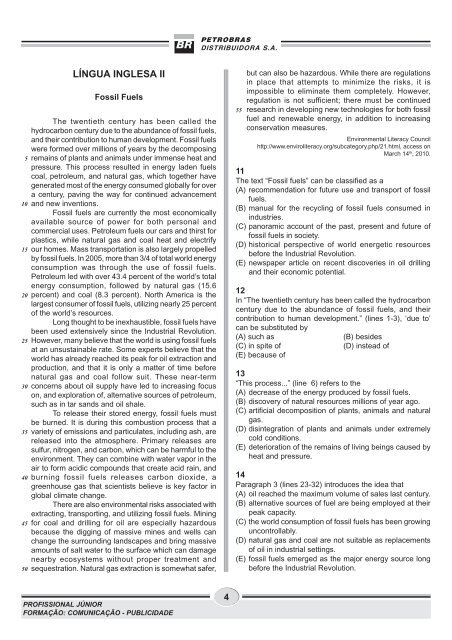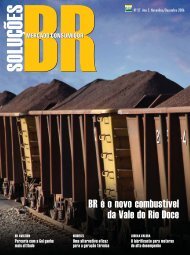Formação: Comunicação / Publicidade - Petrobras Distribuidora
Formação: Comunicação / Publicidade - Petrobras Distribuidora
Formação: Comunicação / Publicidade - Petrobras Distribuidora
You also want an ePaper? Increase the reach of your titles
YUMPU automatically turns print PDFs into web optimized ePapers that Google loves.
5<br />
10<br />
15<br />
20<br />
25<br />
30<br />
35<br />
40<br />
45<br />
50<br />
LÍNGUA INGLESA II<br />
Fossil Fuels<br />
The twentieth century has been called the<br />
hydrocarbon century due to the abundance of fossil fuels,<br />
and their contribution to human development. Fossil fuels<br />
were formed over millions of years by the decomposing<br />
remains of plants and animals under immense heat and<br />
pressure. This process resulted in energy laden fuels<br />
coal, petroleum, and natural gas, which together have<br />
generated most of the energy consumed globally for over<br />
a century, paving the way for continued advancement<br />
and new inventions.<br />
Fossil fuels are currently the most economically<br />
available source of power for both personal and<br />
commercial uses. Petroleum fuels our cars and thirst for<br />
plastics, while natural gas and coal heat and electrify<br />
our homes. Mass transportation is also largely propelled<br />
by fossil fuels. In 2005, more than 3/4 of total world energy<br />
consumption was through the use of fossil fuels.<br />
Petroleum led with over 43.4 percent of the world’s total<br />
energy consumption, followed by natural gas (15.6<br />
percent) and coal (8.3 percent). North America is the<br />
largest consumer of fossil fuels, utilizing nearly 25 percent<br />
of the world’s resources.<br />
Long thought to be inexhaustible, fossil fuels have<br />
been used extensively since the Industrial Revolution.<br />
However, many believe that the world is using fossil fuels<br />
at an unsustainable rate. Some experts believe that the<br />
world has already reached its peak for oil extraction and<br />
production, and that it is only a matter of time before<br />
natural gas and coal follow suit. These near-term<br />
concerns about oil supply have led to increasing focus<br />
on, and exploration of, alternative sources of petroleum,<br />
such as in tar sands and oil shale.<br />
To release their stored energy, fossil fuels must<br />
be burned. It is during this combustion process that a<br />
variety of emissions and particulates, including ash, are<br />
released into the atmosphere. Primary releases are<br />
sulfur, nitrogen, and carbon, which can be harmful to the<br />
environment. They can combine with water vapor in the<br />
air to form acidic compounds that create acid rain, and<br />
burning fossil fuels releases carbon dioxide, a<br />
greenhouse gas that scientists believe is key factor in<br />
global climate change.<br />
There are also environmental risks associated with<br />
extracting, transporting, and utilizing fossil fuels. Mining<br />
for coal and drilling for oil are especially hazardous<br />
because the digging of massive mines and wells can<br />
change the surrounding landscapes and bring massive<br />
amounts of salt water to the surface which can damage<br />
nearby ecosystems without proper treatment and<br />
sequestration. Natural gas extraction is somewhat safer,<br />
PROFISSIONAL JÚNIOR<br />
FORMAÇÃO: COMUNICAÇÃO - PUBLICIDADE<br />
4<br />
55<br />
but can also be hazardous. While there are regulations<br />
in place that attempts to minimize the risks, it is<br />
impossible to eliminate them completely. However,<br />
regulation is not sufficient; there must be continued<br />
research in developing new technologies for both fossil<br />
fuel and renewable energy, in addition to increasing<br />
conservation measures.<br />
Environmental Literacy Council<br />
http://www.enviroliteracy.org/subcategory.php/21.html, access on<br />
March 14th , 2010.<br />
11<br />
The text “Fossil fuels” can be classified as a<br />
(A) recommendation for future use and transport of fossil<br />
fuels.<br />
(B) manual for the recycling of fossil fuels consumed in<br />
industries.<br />
(C) panoramic account of the past, present and future of<br />
fossil fuels in society.<br />
(D) historical perspective of world energetic resources<br />
before the Industrial Revolution.<br />
(E) newspaper article on recent discoveries in oil drilling<br />
and their economic potential.<br />
12<br />
In “The twentieth century has been called the hydrocarbon<br />
century due to the abundance of fossil fuels, and their<br />
contribution to human development.” (lines 1-3), ‘due to’<br />
can be substituted by<br />
(A) such as (B) besides<br />
(C) in spite of (D) instead of<br />
(E) because of<br />
13<br />
“This process...” (line 6) refers to the<br />
(A) decrease of the energy produced by fossil fuels.<br />
(B) discovery of natural resources millions of year ago.<br />
(C) artificial decomposition of plants, animals and natural<br />
gas.<br />
(D) disintegration of plants and animals under extremely<br />
cold conditions.<br />
(E) deterioration of the remains of living beings caused by<br />
heat and pressure.<br />
14<br />
Paragraph 3 (lines 23-32) introduces the idea that<br />
(A) oil reached the maximum volume of sales last century.<br />
(B) alternative sources of fuel are being employed at their<br />
peak capacity.<br />
(C) the world consumption of fossil fuels has been growing<br />
uncontrollably.<br />
(D) natural gas and coal are not suitable as replacements<br />
of oil in industrial settings.<br />
(E) fossil fuels emerged as the major energy source long<br />
before the Industrial Revolution.
















